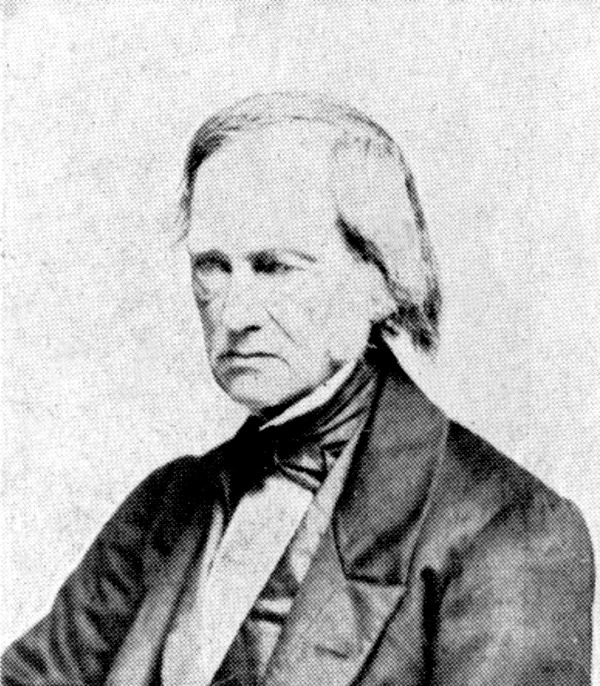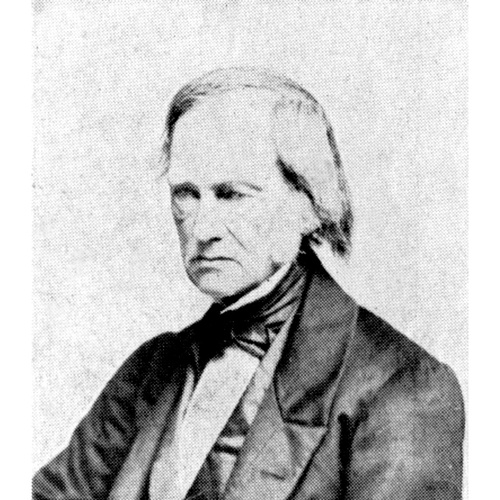
Source: Link
BUELL, WILLIAM, journalist and politician; b. 28 Feb. 1792 at Elizabethtown (Brockville), Upper Canada, eldest son of Martha Naughton and William Buell*, the loyalist founder of Brockville; m. first, Mary-Ann Angelica Story, by whom he had three children, secondly, Deborah Dockstader, by whom he had four children, and thirdly, Catherine Dockstader; d. 29 April 1862 at Brockville.
William Buell was educated in a local school financed largely by his father and at Les Cèdres, Lower Canada. An Anglican in his early years, he spent most of his adult life as a Presbyterian. He was decorated for participating in 1813 in the battle at Crysler’s Farm and in the attack on Ogdensburg, N.Y., led by “Red George” Macdonell.
Buell inherited 125 acres of prime land in the Brockville area, operated a book store in the town from at least 1830 until 1852, and was editor of the Brockville Recorder from 1823 to 1849. Under his editorship and with the aid of his brother, Andrew Norton Buell*, the Recorder became a prominent newspaper which supported reform causes and expounded the views of much of eastern Upper Canada. During the 1820s and early 1830s it particularly represented the interests of Brockville expansionists such as James Morris who were attempting to develop a system of canals on the St Lawrence River so that Brockville could compete with other commercial centres such as Kingston and York (Toronto). When the flow of Upper Canadian trade shifted from the St Lawrence to Toronto and the Erie Canal in the late 1830s and 1840s, the Recorder increasingly articulated the views of comparatively static agrarian and business interests in Leeds County. Buell came to recognize that Brockville would be surpassed by other centres and that canal and railway developments were disastrously expensive. He opposed costly public works projects because he believed they overtaxed the poor and encouraged corruption.
Buell inherited from his father a long-standing local rivalry with the loyalist and Tory families of Solomon* and Ephraim Jones* and Levius Peters Sherwood*. The competition seems to have been motivated only occasionally by personal animus; usually it emanated from pronounced ideological differences, intense political ambitions, and competition for government patronage. Despite the intensity of the rivalries, the four old families between 1820 and 1860 frequently submerged differences and cooperated in economic and social ventures, especially during the early 1830s, when they campaigned for increased autonomy for Brockville (which became Upper Canada’s first town under the authority of a police board in 1832), the construction of locally owned steamships, and the improvement of the St Lawrence transportation system. William Buell played a prominent role in these joint efforts.
This frequent cooperation, however, did not produce harmonious political relationships. From 1801 until the 1860s the four families struggled for political supremacy in the Brockville area, and the Joneses and Sherwoods often joined forces to thwart the Buells. William Buell was a stable and effective leader whose ability frequently enabled his family and the Reform cause in Leeds to equal the Tory forces.
The arrival in the 1820s and 1830s of thousands of Protestant Irish immigrants who settled in the interior townships complicated political competition in Leeds. Viewed suspiciously by older settlers and unfamiliar with the colony’s economic, social, and political institutions, the Irish soon became a discordant local element. Organized in Orange lodges, they constituted a powerful Conservative voting bloc under the leadership of Ogle R. Gowan*. In the provincial election of 1830 Buell and his Reform running mate, Mathew H. Howard, defeated Gowan and Henry Sherwood* in Leeds, but Gowan received more votes than Sherwood and only 70 less than Buell. In the assembly Buell became a strong supporter of a decentralized education system, temperance legislation, cautious economic expansion, and liberal political reform.
Between elections Buell used the Recorder to fight Gowan, who employed a series of financially troubled newspapers he operated in Brockville. In the 1834 election Buell and Howard were opposed by Gowan and Robert Sympson Jameson*, the attorney general. The election was conducted at the village of Beverly, an Orange stronghold. Widespread drinking, violence, and intimidation, especially of Reform voters, marked the election. Buell and Howard withdrew and on their appeal the Reform-dominated assembly ordered a new election, but Lieutenant Governor Sir John Colborne again designated Beverly as the polling place. In the election held in March 1835 Buell and Howard again charged intimidation and appealed to the assembly, which passed a special election act designating four polling stations in Leeds County, thereby making it difficult for Gowan’s supporters to disrupt the voting. Buell and Howard easily won the by-election of 28 March 1836. In the summer of 1836 Sir Francis Bond Head* called a new general election. Gowan and the old Tory families buried their differences and formed a strong anti-Reform coalition in Brockville and throughout Leeds to support Head. The county election, held at Beverly, saw Buell and the Reformers soundly defeated.
Following this reversal, Buell entered a period of relative political inactivity. He was a devoted monarchist and an adherent of the British liberalism of Robert* and William Warren Baldwin*. He favoured an extended franchise, responsible government, and educational reform, and advocated an increasing role for the press as educator. Like the Baldwins in Toronto, he withdrew from the Reform movement as William Lyon Mackenzie and other radicals gained influence. When rebellion broke out in 1837, Buell was the first local militia officer to report for duty against the rebels. In 1838 he led his battalion to Prescott to resist the Patriot invasion.
After the rebellion Buell started a long campaign to restore the Reform cause in the county. The Recorder increasingly voiced the attitudes of eastern Upper Canadian farmers, and Buell expounded on the need for agrarian reform, reduced government expenditures, regional improvements, and local control. His campaign was in part rewarded in 1848, when, though he lost his own bid for a seat in Brockville, his nephew, William Buell Richards*, won easily in Leeds County. Richards and his brother, Albert Norton Richards, were to become important Reform politicians in the 1850s and 1860s.
William Buell sold the Recorder in 1849 to David Wylie and William Sutton and became a gentleman farmer, spending much of his time in Brockville. He was mayor of the town in 1856 and 1857; his term of office was featured by cautious expenditure and careful administration. Buell retired to his farm in 1858 and died there in 1862.
PAC, MG 24, B75. PAO, Buell (Andrew Norton) papers. Brockville Recorder (Brockville, [Ont.]), 1830–49. Gazette (Brockville, [Ont.]), 1828–32. T. W. H. Leavitt, History of Leeds and Grenville, Ontario, from 1749 to 1879, with illustrations and biographical sketches of some of its prominent men and pioneers (Brockville, Ont., 1879). G. R. I. MacPherson, “The code of Brockville’s Buells” (unpublished ma thesis, University of Western Ontario, London, Ont., 1966). Hereward Senior, Orangeism, the Canadian phase (Toronto, 1972). E. M. Richards, “The Joneses of Brockville and the Family Compact,” OH, LX (1968), 169–84.
Cite This Article
Ian MacPherson, “BUELL, WILLIAM (1792-1862),” in Dictionary of Canadian Biography, vol. 9, University of Toronto/Université Laval, 2003–, accessed January 1, 2026, https://www.biographi.ca/en/bio/buell_william_1792_1862_9E.html.
The citation above shows the format for footnotes and endnotes according to the Chicago manual of style (16th edition). Information to be used in other citation formats:
| Permalink: | https://www.biographi.ca/en/bio/buell_william_1792_1862_9E.html |
| Author of Article: | Ian MacPherson |
| Title of Article: | BUELL, WILLIAM (1792-1862) |
| Publication Name: | Dictionary of Canadian Biography, vol. 9 |
| Publisher: | University of Toronto/Université Laval |
| Year of publication: | 1976 |
| Year of revision: | 1976 |
| Access Date: | January 1, 2026 |



